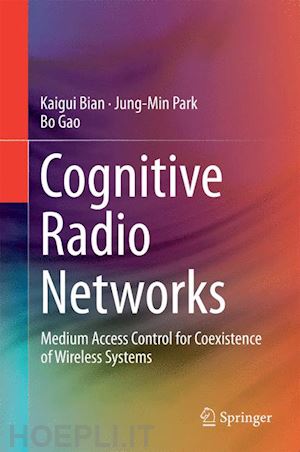

Questo prodotto usufruisce delle SPEDIZIONI GRATIS
selezionando l'opzione Corriere Veloce in fase di ordine.
Pagabile anche con Carta della cultura giovani e del merito, 18App Bonus Cultura e Carta del Docente
This book gives a comprehensive overview of the medium access control (MAC) principles in cognitive radio networks, with a specific focus on how such MAC principles enable different wireless systems to coexist in the same spectrum band and carry out spectrum sharing. From algorithm design to the latest developments in the standards and spectrum policy, readers will benefit from leading-edge knowledge of how cognitive radio systems coexist and share spectrum resources. Coverage includes cognitive radio rendezvous, spectrum sharing, channel allocation, coexistence in TV white space, and coexistence of heterogeneous wireless systems.
Introduction.- Taxonomy of Coexistence Mechanisms.- Coexistence-aware Spectrum Sharing for Homogeneous Cognitive Radio Net-works.- Frequency Reuse over A Single TV White Space Channel.- Channel Assignment for Multi-hop Cognitive Radio Networks.- Ecology-inspired Coexistence of Heterogeneous Cognitive Radio Networks.
Kaigui Bian received his B.S. degree in Computer Science from Peking University in 2001, and received his Ph.D. degree in Computer engineering from Virginia Tech in 2011. He is currently an Assistant Professor in the Institute of Network Computing and Information Systems, School of EECS at Peking University. His research interests include cognitive radio networks, mobile computing, network security and privacy. He was a visiting scholar at Microsoft Research Asia in 2013. He is a member of the IEEE, the ACM, and the CCF.
Jung-Min “Jerry” Park received a Ph.D. degree in electrical and computer engineering from Purdue University in 2003. He is currently an associate professor in the Department of Electrical and Computer Engineering at Virginia Tech, and the site director of a National Science Foundation (NSF) Industry-University Cooperative Research Center (I-UCRC) called Broadband Wireless Access & Applications Center (BWAC). As the site director of BWAC at Virginia Tech, Park is leading several sponsored research projects on wireless networks and network security. He is widely recognized for his pioneering work on enforcement and security problems in cognitive radio networks. His research interests include cognitive radio networks, spectrum sharing technologies, network security and privacy, and applied cryptography. Current or recent research sponsors include the NSF, National Institutes of Health (NIH), Defense Advanced Research Projects Agency (DARPA), Office of Naval Research (ONR), SANS (SysAdmin, Audit, Network Security) Institute, Motorola Solutions, Samsung Electronics, and SCA Techniques. More details on his research interests can be found athttp://www.arias.ece.vt.edu and http://www.bwac.wireless.vt.edu/index.html. He is a recipient of a 2014 Virginia Tech College of Engineering Faculty Fellow Award, a 2008 NSF Faculty Early Career Development (CAREER) Award, a 2008 Hoeber Excellence in Research Award, a 1998 AT&T Leadership Award, and a coauthor of a paper that won the Best Paper Award at the 2014 IEEE Symposium on New Frontiers in Dynamic Spectrum Access Networks (DySPAN). He is a senior member of the IEEE and the ACM, and a member of the Korean-American Scientists and Engineers Association (KSEA).
Bo Gao is currently a Ph.D. student in the Department of Electrical and Computer Engineering at Virginia Tech. He received his Bachelor’s degree in Electrical Engineering from Beijing Jiaotong University, China in 2006, and his Master’s degree in Electrical Engineering from Shanghai Jiaotong University, China in 2009. His research interests include wireless networking, dynamic spectrum access, and network coexistence.











Il sito utilizza cookie ed altri strumenti di tracciamento che raccolgono informazioni dal dispositivo dell’utente. Oltre ai cookie tecnici ed analitici aggregati, strettamente necessari per il funzionamento di questo sito web, previo consenso dell’utente possono essere installati cookie di profilazione e marketing e cookie dei social media. Cliccando su “Accetto tutti i cookie” saranno attivate tutte le categorie di cookie. Per accettare solo deterninate categorie di cookie, cliccare invece su “Impostazioni cookie”. Chiudendo il banner o continuando a navigare saranno installati solo cookie tecnici. Per maggiori dettagli, consultare la Cookie Policy.